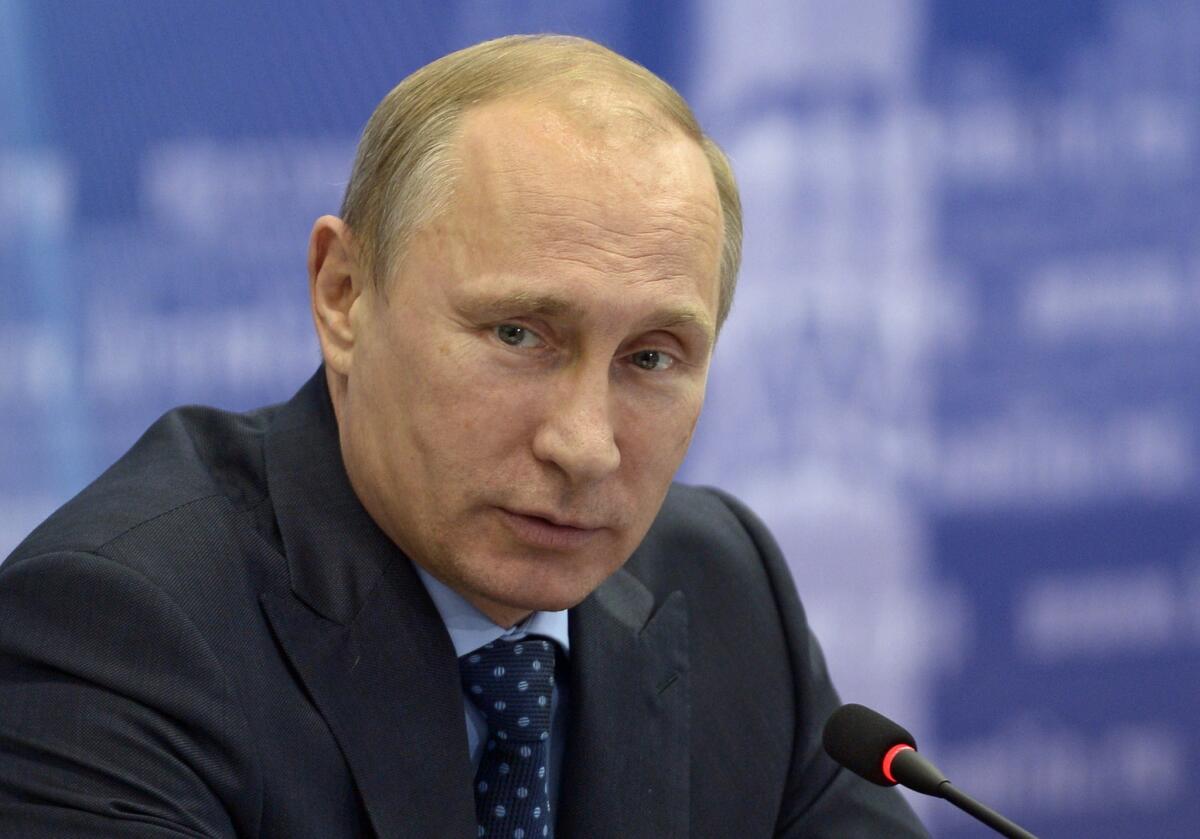Putin has a new headache in Ukraine: Now Europe is watching

- Share via
It’s neither pleasant nor polite to say it, but the crash of Malaysia Airlines Flight 17 may have been the best thing to happen to President Obama’s policy on Ukraine in weeks.
Until the plane went down with 298 passengers and crew last week, the nasty little war in eastern Ukraine had almost dropped from public view. Obama’s strategy of nudging Europe to escalate economic sanctions against Russia was getting nowhere, a victim of Europeans’ desire to protect their business with Moscow. Ukraine’s armed forces were making little progress on the ground against Russian-armed separatists. And Russia’s Vladimir Putin was pressing for a cease-fire that would have given the rebels a long-term foothold on the ground, securing Putin a long-term chokehold over the government in Kiev.
In short, Putin appeared to be slowly winning.
Now the picture has changed, thanks to whoever fired the sophisticated Russian-made antiaircraft missile that, mounting evidence suggests, brought the Malaysian airliner down. We may never know for sure whether the culprits were Ukrainian separatists, Russian officers operating under the guise of Ukrainian separatists or (implausibly) someone else entirely. But the behavior of the rebels and the Russian government in the aftermath — blocking access to the bodies, tampering with the evidence and spinning ludicrous conspiracy theories — didn’t inspire faith in their protestations of innocence.
By the beginning of this week even Putin was hurriedly making conciliatory noises, promising that “everything possible” would be done to make an international investigation possible. “Rather than dividing us, tragedies of this sort should bring us together,” he said. “No one has the right to use this tragedy to pursue their own political goals.”
Too late for that. Russia’s critics were entirely justified in using the tragedy to point out that the ill-disciplined rebels swarming over the crash site were funded and equipped by Putin’s government, which — until this week, at least — had publicly cast them as freedom fighters. Ukraine’s government took advantage of the moment to launch a new military offensive against the rebels in Donetsk, only 50 miles from the crash site.
And the European Union agreed Tuesday to impose new targeted economic sanctions against individual Russian officials and to actively consider broader economic sanctions against entire sectors of the Russian economy.
The new EU sanctions weren’t massive; they basically just matched the new round of U.S. sanctions that Obama announced this month. But the EU also decided to draw up options for broader measures that would block Russia’s access to Europe’s capital markets and limit sales of military technology if Putin doesn’t stop the flow of weapons, equipment and militants into eastern Ukraine. That was a step the European foreign ministers had staunchly resisted until now.
So Putin has a problem he didn’t have a week ago: Europe’s politicians and public are watching. And his chosen instrument for meddling in Ukraine — the separatist forces — suddenly looks like a liability as well as an asset.
“In our view, something fundamental changed last Thursday,” Dutch Prime Minister Mark Rutte said. Now, he says, there is a desire across the EU for a unified approach that will “put pressure on Russia to do more.”
The EU is still divided over the exact nature of the sanctions. Germany wants to protect its Russian natural gas supplies; Britain wants to keep Russian capital flowing into London’s financial markets; France wants to protect its arms deals with Putin. But in one measure of the changing climate, French President Francois Hollande said for the first time this week that Russia shouldn’t count on getting both of the helicopter assault ships it has bought from his country. The first ship will be delivered in October, he said, but the second “depends on the attitude of Russia.”
None of this adds up to a turning point in the battle for Ukraine just yet. The sanctions announced so far are enough to worry Russian economic planners, who were already looking at a growth rate near zero, but not enough to force Putin’s hand. “One difference between Americans and Europeans is that you think the Russians will behave better if you apply sanctions,” German politician Karsten Voigt told me recently. “We don’t.”
But until the crash of Flight 17, Putin was quietly waiting for the West to lose interest in the conflict and expecting the sanctions to gradually erode. That calculation has changed.
The EU is now demanding more clearly that Russia cut off supplies to the rebels in eastern Ukraine; Putin is unlikely to comply, but not doing so comes with more risk now. And more Western attention and support can only help the Ukrainian government in Kiev as it struggles to build its army and take back some of the territory the rebels have seized.
Economic sanctions alone won’t end the war in eastern Ukraine; Europe is too divided and Putin too resilient for that.
But if the tragedy of Flight 17 buys time for Ukraine’s new government to get organized, bolsters Western support for economic aid to Kiev and increases the cost of Putin’s Ukrainian adventure to Russia, it could be a turning point for the region.
Twitter: @DoyleMcManus
More to Read
A cure for the common opinion
Get thought-provoking perspectives with our weekly newsletter.
You may occasionally receive promotional content from the Los Angeles Times.







